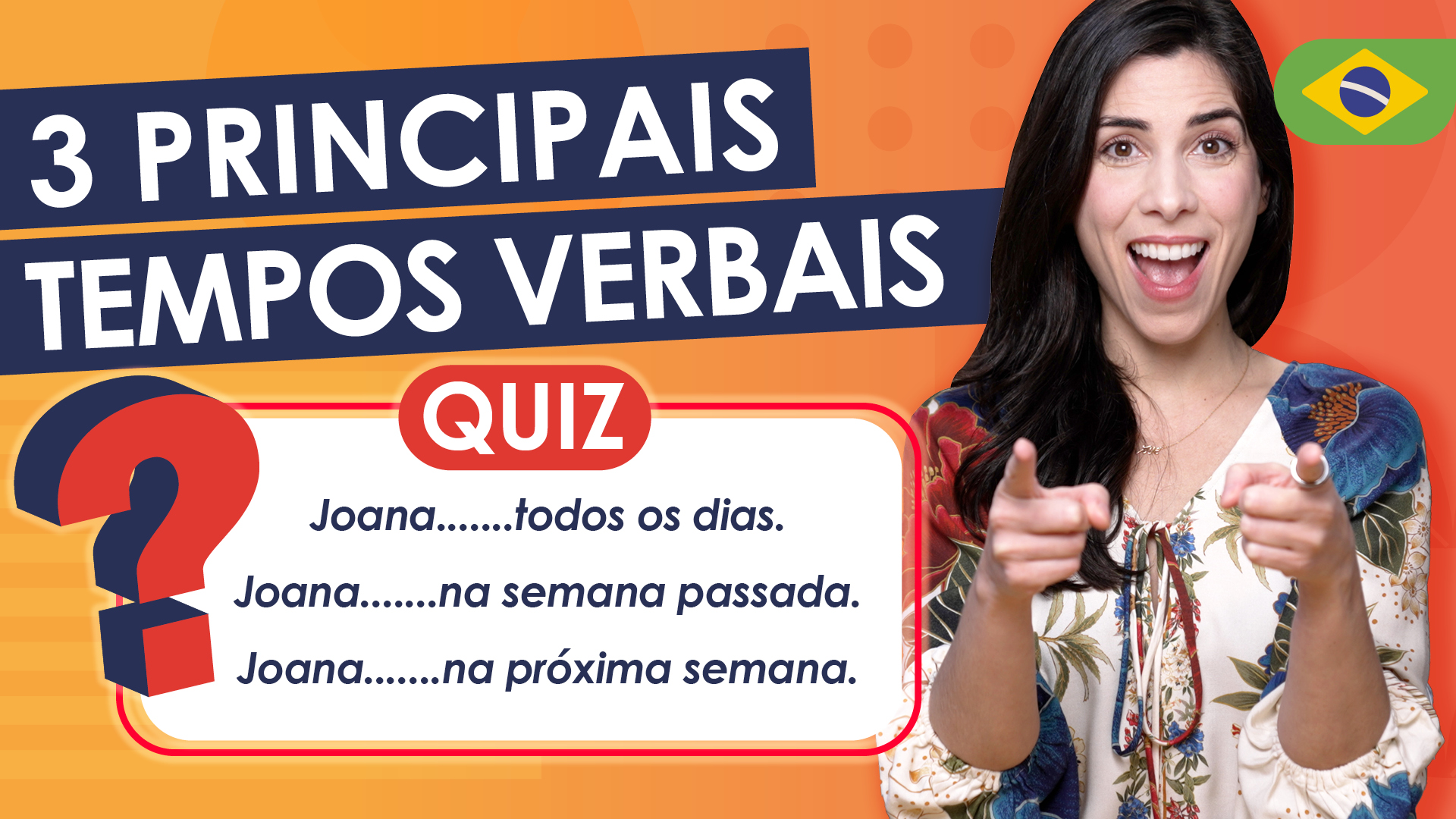Olá, queridos alunos! (Hello, dear students!)
Today’s lesson will be interactive! We’re going to practice basic conversation in Portuguese. This exercise will help you prepare yourself to have a conversation with Brazilians in real situations. Watch the video and practice speaking with me!
This lesson includes a free PDF with a list of 100 common questions so you can practice basic conversation in Portuguese. Fill out the form below to download your worksheet.
50 Common Questions & Answers in Portuguese
1. Qual é o seu nome? Como você se chama? (What is your name? What do people call you?)
– Meu nome é Virginia. Eu me chamo Virginia. (My name is Virginia. I’m Virginia.)
2. Qual é o seu sobrenome? (What is your last name?)
– Meu sobrenome é Langhammer. (My last name is Langhammer.)
3. De onde você é? (Where are you from?)
– Eu sou do Brasil. Sou brasileira. (I am from Brazil. I am Brazilian.)
4. Onde você mora? (Where do you live?)
– Eu moro em Nova York, nos Estados Unidos. (I live in New York, in the United States.)
5. Quantos anos você tem? (How old are you?)
– Eu tenho 42 (quarenta e dois) anos. (I am 42 years old.)
6. Em que ano você nasceu? (What year were you born in?)
– Eu nasci em 1982 (mil novecentos e oitenta e dois). (I was born in 1982.)
7. Quando é o seu aniversário? (When is your birthday?)
– Meu aniversário é no dia 25 de junho. (My birthday is on June 25th.)
8. Que dia é hoje? (What’s today’s date?)
– Hoje é dia 7 de outubro de 2024. (Today is October 7, 2024.)
9. Que horas são agora? (What time is it?)
– Agora, são três da tarde. (Right now, it’s three in the afternoon.)
10. O que você faz? Qual é a sua profissão ou ocupação? (What do you do? What is your profession or occupation?)
– Eu sou professora de português e empreendedora. (I am a Portuguese teacher and entrepreneur.)
11. Onde você trabalha ou estuda? (Where do you work or study?)
– Eu trabalho em casa. (I work from home.)
12. Qual é o seu telefone? (What’s your phone number?)
– Meu telefone é 123-456-7899. (My phone number is 123-456-7899.)
13. Qual é o seu e-mail? (What’s your email address?)
– Meu e-mail é school@speakingbrazilian.com (My email is school@speakingbrazilian.com)
14. Você é casada(o) ou solteira(o)? (Are you married or single?)
– Sou casada há 12 anos. (I’ve been married for 12 years.)
15. Qual é o nome do seu marido (ou esposa)? (What’s your husband’s (or wife’s) name?)
– O nome do meu marido é Rob. (My husband’s name is Rob.)
16. Onde você está agora? (Where are you now?)
– Estou em casa. (I am at home.)
17. Você mora em casa ou apartamento? (Do you live in a house or apartment?)
– Moro em uma casa. (I live in a house.)
18. Como é a sua casa ou apartamento? (What’s your house or apartment like?)
– A minha casa é aconchegante, tem dois quartos, dois banheiros, e um quintal grande com muitas árvores. (My house is comfortable, it has two bedrooms, two bathrooms, and a big yard with lots of trees.)
19. Você gosta da sua casa? (Do you like your house?)
– Eu gosto muito da minha casa. (I like my house a lot.)
20. Você gosta do seu trabalho? (Do you like your work?)
– Eu amo o meu trabalho. (I love my work.)
21. O que você gosta de fazer nas horas livres? (What do you like to do in your free time?)
– Eu gosto de caminhar ao ar livre ou ler um livro. (I like to walk outside or read a book.)
22. Você acorda cedo? (Do you wake up early?)
– Normalmente, eu acordo entre 7 e 7:30 da manhã. (I normally wake up between 7 and 7:30 in the morning.)
23. O que você come no café da manhã? (What do you eat for breakfast?)
– Normalmente, eu tomo café preto e como duas fatias de pão com tofu mexido. (I normally drink black coffee, and I eat two slices of bread with scrambled tofu.)
24. Normalmente, você come em casa ou fora de casa? (Do you normally eat at home or go out to eat?)
– Eu como em casa quase todos os dias. (I eat at home almost every day.)
25. Qual é a sua comida favorita? (What is your favorite food?)
– Minha comida favorita é a brasileira. (My favorite food is Brazilian food.)
26. Você gosta de cozinhar? (Do you like to cook?)
– Gosto, mas prefiro quando meu marido cozinha. (I like to cook, but I prefer it when my husband cooks.)
27. Você tem irmãos ou irmãs? Quantos? (Do you have brothers or sisters? How many?)
– Tenho três irmãos. (I have three brothers.)
28. Você tem filhos? (Do you have children?)
– Não tenho filhos. (I don’t have children.)
29. Você tem carro? (Do you have a car?)
– Tenho. (I do.)
30. Você prefere viajar de carro, trem ou avião? (Do you prefer to travel by car, train, or airplane?)
– Eu amo viajar de qualquer forma. (I love traveling by any means.)
31. Você prefere café ou chá? (Do you prefer coffee or tea?)
– Prefiro café. (I prefer coffee.)
32. Você prefere o verão ou o inverno? (Do you prefer summer or winter?)
– Prefiro o verão. (I prefer summer.)
33. O que você fez no último verão? (What did you do last summer?)
– No último verão, eu viajei ao Brasil por um mês. (Last summer, I went to Brazil for a month.)
34. O que você vai fazer no próximo fim de semana? (What are you going to do next weekend?)
– No próximo fim de semana, eu vou descansar em casa. (Next weekend, I’m going to rest at home.)
35. Você acha que vai chover no fim de semana? (Do you think it will rain this weekend?)
– Acho que não. (I don’t think so.)
36. Você vai à academia? Com que frequência? (Do you go to the gym? How often?)
– Sim, eu vou à academia duas vezes por semana. (Yes, I go to the gym two times a week.)
37. Você sabe tocar um instrumento musical? (Do you know how to play a musical instrument?)
– Não, não sei tocar nenhum instrumento musical, mas gostaria de aprender. (No, I don’t know how to play any musical instruments, but I’d like to learn.)
38. Você conhece brasileiros fora do Brasil? (Do you know Brazilians outside of Brazil?)
– Eu conheço alguns brasileiros que moram em Nova York e na Europa. (I know a few Brazilians who live in New York and Europe.)
39. Você conhece o Rio de Janeiro? (Have you been to Rio de Janeiro?)
– Conheço. Já fui lá muitas vezes. (I have. I’ve been there many times.)
40. Você já foi a São Paulo? (Have you been to São Paulo?)
– Já. Eu morei lá por 10 anos. (Yes. I lived there for 10 years.)
41. O que você fez ontem? (What did you do yesterday?)
– Ontem, eu dei aulas e escrevi roteiros de vídeos. (Yesterday, I gave classes and wrote video scripts.)
42. O que você vai fazer amanhã? (What are you going to do tomorrow?)
– Amanhã, eu vou trabalhar, e depois vou para a academia. (Tomorrow, I will work, and afterwards, I will go to the gym.)
43. O que você está fazendo agora? (What are you doing right now?)
– Agora, estou gravando um vídeo. (I am recording a video now.)
44. Onde você morava quando era criança? (Where did you live when you were a child?)
– Eu morava no nordeste do Brasil. (I lived in Northeastern Brazil.)
45. O que você costumava fazer no passado que não faz mais hoje? (What did you use to do that you don’t do anymore?)
– Eu costumava dormir tarde. Hoje durmo cedo. (I used to go to bed late. These days I go to bed early.)
46. Quantas línguas você fala hoje? Quais? (How many languages do you speak these days? Which ones?)
– Eu falo cinco línguas, mas não sou totalmente fluente em todas elas. Eu falo português, inglês, francês, espanhol e italiano. (I speak five languages, but I’m not totally fluent in all of them. I speak Portuguese, English, French, Spanish, and Italian.)
47. Quais línguas você gostaria de aprender? (Which languages would you like to learn?)
– Primeiro, gostaria de ficar fluente em italiano. Depois, gostaria de aprender alemão. (First, I’d like to be fluent in Italian. Then, I’d like to learn German.)
48. Para onde você gostaria de viajar um dia? (Where would you like to travel to one day?)
– Eu gostaria de viajar para Fernando de Noronha um dia. (I would like to travel to Fernando de Noronha one day.)
49. Qual é o seu lugar favorito em todo o mundo? (What’s your favorite place in the whole world?)
– Acho que minha casa é meu lugar favorito. (I think my house is my favorite place.)
50. Quais são seus planos para hoje? (What are your plans for today?)
– Depois desta aula, eu vou descansar. (After this class, I’m going to rest.)
Free PDF!
This lesson includes a free PDF with a list of 100 common questions so you can practice basic conversation in Portuguese. Fill out the form below to download your worksheet.
Online Brazilian Portuguese Courses
If you enjoyed this lesson, you’ll love our courses! At Speaking Brazilian School, we offer digital courses, small group classes, and private lessons. Click here to learn more about our Brazilian Portuguese online classes.
Até a próxima!
Virginia & Speaking Brazilian Team


